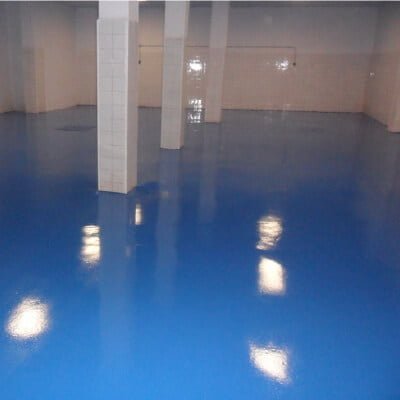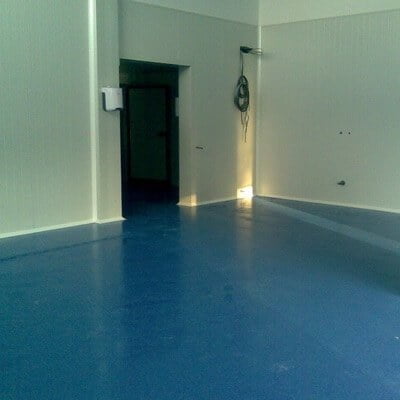Polyurethane is a type of resin widely used in industrial constructions since it has favorable qualities to resist ultraviolet radiation, as well as chemical and physical abrasion.
In industrial buildings, just as polished concrete flooring is an alternative to epoxy resin, polyurethane is also an epoxy resin, used as a substance to cover a floor.
A polyurethane flooring is characterized by being flexible and resistant to wear, however, it can’t be applied in all industries. Accordingly, certain conditions are required for optimal and lasting performance.
What is polyurethane?
In general terms, polyurethane is a synthetic polymer (resin) that results from condensation treatments used on certain organic compounds (polyols with diisocyanates).

Depending on the polyurethane’s molecular structure, there are two types of polyurethane:
- Thermosetting resins.
- Thermoplastic resins.
Both polyurethane resins are plastic materials with low thermal conductivity, which are differentiated by the degree of fluidity.
Uses of polyurethane
Polyurethane is a highly versatile resin in industrial and civil constructions, thanks to the fact that it can manifest itself in two different ways.
Thermoset polyurethane is used as a foam to thermally and acoustically insulate any type of building.
On the other hand, thermoplastic polyurethane stands out for being an elastomer, which improves the finish and durability of a concrete floor. It is also the most commonly used resin in industrial constructions.
Among the uses of thermoplastic polyurethane, the following stand out.
Crack repair
The polyurethane’s high elasticity allows to close any crack openings, waterproofing the surface, and providing the repaired area with an aesthetic finish.
When repairing concrete cracks, polyurethane should not be applied directly on to the opening, as ports may be required depending on the properties of the resin.
Sealing concrete surface pores
In addition to elasticity, thermoplastic polyurethane is a fluid with a relatively high viscosity that enables it to penetrate the concrete’s tiny pores, covering any gap in the stone mass.
The thermoplastic characteristics are also used for the expansion joints repair, offering an elastic filler that is resistant to chemical attacks.
The polyurethane seal provides extra protection to the concrete floor, preventing harmful substances from entering into the mass. In addition to this, it reduces the impact of the adverse effects of the weather.

Polyurethane Flooring: Cement-polyurethane mix
A polyurethane flooring is characterized by being a hybrid mix between thermoplastic resin, and cement. This mixture is usually applied as a covering mortar.
Cement-polyurethane mixtures provide greater mechanical, chemical, thermal and waterproofing resistance to conventional flooring. Also, they contribute to hygiene and safety, since it is also a non-slip surface.
Polyurethane flooring is widely used in the chemical, pharmaceutical, and food industries.
Advantages and disadvantages of polyurethane as a material for construction
Like all construction materials, polyurethane has both advantages and disadvantages in its usage.
Among the most notable advantages are the following:
- Thermal and acoustic insulation.
- It has a high capability to neutralize thermal shocks.
- Waterproof and flexible.
- High tolerance to freezing temperatures.
- Resistance to abrasion, chemical attacks and ultraviolet radiation.
In contrast, the main disadvantages are:
- Sensitivity to humidity: the presence of humidity increases its thermal conductivity.
- Polyurethane coatings have a low repair potential, they must be renewed; removed and replaced.
- Its flexibility makes it a soft material susceptible to scratches.
- Installing polyurethane coatings requires specialized personnel, due to its complexity.
Is the use of polyurethane flooring recommended for industrial warehouses?
Polyurethane is a valuable material for industrial warehouses when it comes to repairing cracks and sealing joints and pores in concrete flooring, as it meets the primary requirements of closing and waterproofing openings and voids.

However, polyurethane flooring is not the best option for an industrial warehouse. This is due to the risk of scratching and temperature changes that can occur in this type of environment.
As we commented before, polyurethane flooring is a good option for industrial environments with demanding activities and not a lot of machinery; For example, chemical and pharmaceutical industries.
Cement-polyurethane mixtures are not the only materials available to improve the mechanical-chemical resistance and impermeability of an industrial concrete floor.
There are chemical treatments that significantly improve the resistance and durability of the flooring.
The BECOSAN® treatment is a systematic process that molecularly densifies the concrete of the pavement, increasing its hardness, which in turn leads to greater strength and durability without affecting the initial composition of the material.
